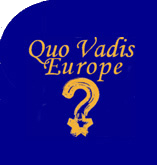
Quo Vadis Europe?
Topics
Results
Events by date
Summit of 28
Essay Contest
Debate Competition
Patrons & Sponsors
Contact
The Cultural Dimension of Enlargement
The Macro Political Dimension of Enlargement
The Citizens' Role in the European Union
***
Focus on the Impact of Enlargement on the Civil Society.
In what way will this process affect the life of the citizens living inside and outside the European Union. What should they expect and what should they not expect regarding their social and personal security standards? Maybe it means that EU citizens loose their jobs just because companies will prefer cheaper working hands out of the new member countries, while those countries experience a braindrain? Will criminality rise because there will be no more borders to check and stop potential criminals? Experiences out of past enlargement processes (e.g. opening to Greece, Spain and Portugal) show that most of those fears were so far without any base. Is today's situation comparable to this past?
Are civil societies in the applicant countries stable and ready enough to enter the European Union? And what will happen to the civil societies of that European countries that are not inside the enlargement process or that might finally not be able to fulfil the criteria? Especially in these countries stability of the civil society is to a significant extent based on the hope to be able to enter the European Union. How can one ensure that this stability will sustain even in this case.
<top>
Focus on the Cultural Dimension
Of the four major cultures which interact on the European continent, so far only two are represented in the European Union with nations. Is the European Union able to cope with an even broader cultural dimension including Slavic and Turk nations? Are civil societies different in these countries? How will those cultures interact and influence each other? Diversity is good as long as it is something easy to understand. People are afraid of the unknown, so our aim is to make different (unfamiliar) cultures familiar, to change the devalued other into something we can understand and accept. Do we strive in that way towards a monolithic culture inside a united Europe or are we able to say "Vive la difference!" and find the unity in our diversity?
<top>
Focus on the Macro Political Dimension.Inside the European Union certain states such as France fear a loss of influence in an enlarged European Union while others such as Germany might gain due to their closeness to the pre-accession countries. The South European member states are afraid to loose supporting subsidies in a future European Union, as the economy of the new member countries will be weaker then theirs. Outside the union Russia is concerned to loose even more influence on its western neighbouring states. Will these fears influence the enlargement process?
To be able to act with more than 15 member states the European Union has to reform its decision-making system. What did this year's Intergovernmental Conference bring in this sense and what are the options discussed in changing the decision making in the European Union?<top>
Focus on the Citizens’ Role in the European UnionEuropean citizens have to be more actively involved in the decision-making processes of the European Union. This is of particular of importance in the upcoming enlargement round. The institutional reform gives the European Union the chance to make its decision making more effective and transparent. It has to be prevented that the Council of Ministers becomes the ruling EU body. The role of the European Commission as the guard of the European treaties should not be weakened. The Parliament, which is the only body elected by the citizens of Europe, should gain more influence. Only if citizens have the feeling that they can have an influence on the European decision making will the European Union come closer to them. The Charter of Fundamental Rights of the European Union is in this sense going in the right direction. It can be used as a base for a European Constitution.
